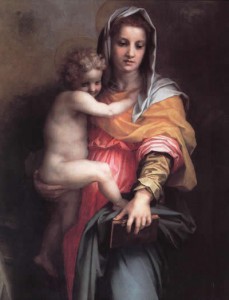Scott Hahn with David Scott
“The kingdom of heaven is at hand,” John proclaims. And the Liturgy today paints us a vivid portrait of our new king and the shape of the kingdom He has come to bring. The Lord whom John prepares the way for in today’s Gospel is the righteous king prophesied in today’s First Reading and Psalm. He is the king’s son, the son of David—a shoot from the root of Jesse, David’s father (see Ruth 4:17).
He will be the Messiah, anointed with the Holy Spirit (see 2 Samuel 23:1; 1 Kings 1:39; Psalm 2:2), endowed with the seven gifts of the Spirit—wisdom, understanding, counsel, strength, knowledge, piety and fear of the Lord.
He will rule with justice, saving the poor from the ruthless and wicked. His rule will be not only over Israel—but will extend from sea to sea, to the ends of the earth. He will be a light, a signal to all nations. And they will seek Him and pay Him homage.
In Him, all the tribes of the earth will find blessing. The covenant promise to Abraham (see Genesis 12:3), renewed in God’s oath to David (see Psalm 89:4, 28), will be fulfilled in His dynasty. And His name will be blessed forever.
In Christ, God confirms His oath to Israel’s patriarchs, Paul tells us in today’s Epistle. But no longer are God’s promises reserved solely for the children of Abraham. The Gentiles, too, will glorify God for His mercy. Once strangers, in Christ they will be included in “the covenants of promise” (see Ephesians 2:12).
John delivers this same message in the Gospel. Once God’s chosen people were hewn from the rock of Abraham (see Isaiah 51:1-2). Now, God will raise up living stones (see 1 Peter 2:5)—children of Abraham born not of flesh and blood but of the Spirit.
This is the meaning of the fiery baptism He brings—making us royal heirs of the kingdom of heaven, the Church.
Origen
Homilies on Saint Luke’s Gospel, 22, 4 (SC 87, p. 303 rev.)
John the Baptist said: “Every valley shall be filled” (Lk 3,5) but it was not John who filled every valley, it was our Lord and Savior… “And the winding roads shall be made straight.” Every one of us was going astray…, and it was Christ’s coming, fulfilled within our very souls, that straightened all that was crooked… Nothing was so resistant as you were. Consider your former unruly desires, your fits of anger and other evil tendencies, as to whether they have disappeared. You will realize that nothing was so resistant as you were or, in an even more expressive phrase, that nothing was so brought low. Your behavior was low, your words and deeds were low.
But my Lord Jesus came: he smoothed down your roughness, he changed all that muddle into roads that joined up, to create a way without obstacles within you, well articulated and swept clean so that God our Father could walk in you and Christ the Lord could make his home in you and say: “My Father and I will come to him and make our dwelling within him” (Jn 14,23).
Pope Benedict XVI
Angelus Address, December 7, 2008
For a week we have been experiencing the liturgical Season of Advent: a season of openness to the future of God, a time of preparation for holy Christmas when he, the Lord, who is the absolute innovation, came to dwell among this fallen humanity to renew it from within. A message full of hope resounds in the liturgy of Advent, inviting us to raise our gaze to the ultimate horizon but at the same time to recognize the signs of the God-with-us in the present.
On this Second Sunday of Advent the Word of God acquires the moving tones of the so-called “Second Isaiah”, who announced to the Israelites, tried by decades of bitter exile in Babylon, liberation at last: “Comfort, comfort my people”, the Prophet says in God’s name. “Speak tenderly to Jerusalem, and cry to her that her warfare is ended” (Is 40: 1-2). This is what the Lord wishes to do in Advent: to speak to the heart of his people and through it to the whole of humanity, to proclaim salvation.
Today too the Church raises her voice: “Make straight in the desert a highway for our God” (Is 40: 3). For the peoples worn out by poverty and hunger, for the hosts of refugees and for all who are suffering grave and systematic violations of their rights, the Church stations herself as a sentinel on the lofty mountain of faith and proclaims: “Behold your God! Behold, the Lord God comes with might” (Is 40: 10).
This prophetic announcement is fulfilled in Jesus Christ, who with his preaching and, later, with his death and Resurrection, brought the ancient promises to fulfilment, revealing an even deeper and more universal perspective. He inaugurated an exodus that was no longer solely earthly, in history, hence temporary, but rather radical and definitive: the transition from the kingdom of evil to the Kingdom of God, from the dominion of sin and death to that of love and life.
Therefore, human hope goes beyond the legitimate expectations of social and political liberation because what Jesus began is a new humanity that comes “from God” but, at the same, time germinates on our earth, to the extent that it lets itself be fertilized by the Lord’s Spirit. Thus it is a question of fully entering the logic of faith: believing in God, in his plan of salvation, and at the same time, striving to build his Kingdom. Justice and peace are in fact gifts of God, but require men and women to be the “good ground” ready to receive the good seed of his Word.

